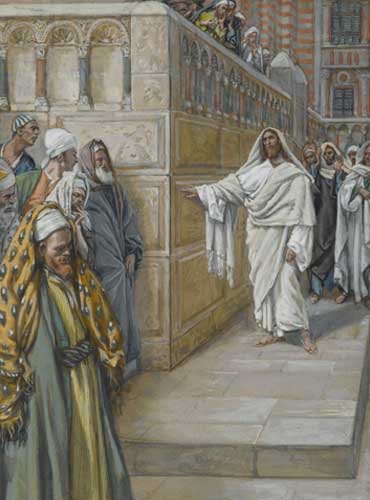Friday of the Second Week of Lent – Option 2 – Mt 21:33-43, 45-46
Today’s first reading and Gospel remind us of God’s providence, and that we need to respond in the proper way.
The first reading marks the beginning of a very long story about Joseph: the whole affair takes about ten chapters to sort out. Let’s recall, just briefly, how much Joseph suffered because of what his brothers did: he was the beloved son of his father, and after bringing back bad reports about his brothers and revealing his dreams to them, his brothers decide to kill him. They repent, and instead just sell him into slavery. Then, Joseph is sold again, this time to Potiphar, pharaoh’s chief steward, and things seem to be going pretty well (for a slave, anyways) until Potiphar’s wife falsely accuses him and Potiphar, seemingly forgetful of all his good work, has Joseph thrown into jail. Even in jail, though, Joseph is put in charge; when he rightly interprets the chief cupbearer’s dream, he begs the man, “Think of me when all is well with you, and please do me the great favor of mentioning me to Pharaoh, to get me out of this place.” However, the cupbearer forgets him, and Joseph is left in prison for another two years until Pharaoh has his dream, and Joseph is in the right place at the right time to accomplish God’s designs.
Even though it all seems very convoluted and twisted, in God’s eyes, the end goal is clear: He’s working out the way of salvation for His Chosen People, from whom will come the Savior. Of course, the lengthy time Joseph spent as a slave is clearly part of God’s timing, and if we look closely, we can even find human reasons why Joseph was there for so many years; for instance, as a Hebrew, he would’ve had to learn the language of the Egyptians and all the customs of the royal household. Of course, God was with him, but even on the human level He was preparing Joseph for his role in salvation history. It’s not that Joseph would have known this at the time, so he simply trusted God and went forward.
Notice too that God even works through evil. At the end, Joseph doesn’t sugarcoat it when he speaks to his brothers: “Even though you meant harm to me, God meant it for good.” It’s hard to translate that phrase well. That verb meant literally means to weave or to plait, which perhaps captures better the interconnectedness of what seems like just random acts of violence and anger, or just plain bad luck on Joseph’s part. In other words, Joseph tells his brothers: what you did was bad; it was evil and sinful. Nonetheless, even that God used for the good of accomplishing His end. The paths we take to religious life, and even sometimes our lives and experiences in religious life, seem sort of twisted or confusing; it’s not always clear what God’s doing in our lives. Yet, we have the certainty that whatever happens, God means “it for good, to achieve his present end, the survival of many people,” starting with our salvation. Often in the moment, we don’t know how this or that particular moment plays into our sanctification, but we have to trust that it does, even if that particular moment involves suffering or sin.
We can see the opposite reaction in today’s Gospel: in a series of homilies on this parable, Saint John Chrysostom points out a number of details, but one of the most important is that we see God’s overwhelming love and providence revealed in the fact that the vineyard owner “himself did the work the tenants should have done [Usually the tenants had to build everything; the owner only gave the land]. It was he who planted a vineyard, and set a hedge around it, and dug a wine press in it and built a tower. He left little for them to do. All they had to do was take care of what was there and to preserve what was given to them. Nothing was left undone but all accomplished. But they made little effort to be productive, even after they had enjoyed such great blessings from him.” “God’s providence had been at work toward them from the outset; [even though] their disposition was murderous from the beginning, nothing had been neglected of” what they needed. God works this way with us as well: He provides us with everything we need to get to heaven.
Sometimes, we can get so caught up on what God isn’t doing in our lives, that we fail to see what He is doing. We want to be saints now, we want to go here or there or do this or that . . . and yet that’s not the path of sanctification God has chosen for us. We can’t take the place of God; He knows what He’s doing. In fact, He is the only one. In short, we can repeat the words of Saint Edith Stein, who wrote: “From God’s point of view — nothing is accidental, my entire life, even in the most minute details, was pre-designed in the plans of divine providence and is thus for the all-seeing eye of God a perfect coherence of meaning.”
Throughout this Lenten season, let us pray, through the intercession of Mary, Mother of Divine Providence, for the grace to trust that God means everything for our good, and that He uses everything to achieve our salvation.

Saint Paul, Priest[1]
[1] We follow J. Holzner, El mundo de San Pablo;





